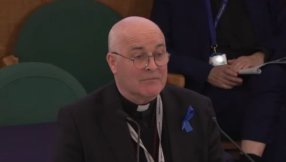
As I have explained in a previous article, one of the television shows I like to watch is Madam Secretary, the fictional account of a female American Secretary of State. In the last episode I watched, a central part of the story was the revelation that the State Department's senior press officer, Daisy Grant, was pregnant.
In the episode her boss and her colleagues discover her pregnancy in various ways, and they are uniformly delighted and supportive, in spite of the fact that Daisy is not married and her pregnancy is the result of a very brief affair with a CIA officer whose death at the hands of a private American military contractor has been central to the storyline in previous episodes.
As I reflected on the episode afterwards, I was struck with how the reaction to the news of Daisy's pregnancy reflected the change in American (and by extension British) sexual ethics since the end of World War II.
Two generations ago, becoming pregnant outside marriage was generally regarded as deeply shameful, with the only way to put things right being for the father to 'accept his responsibilities' by marrying the woman concerned. Today (at least in the prevailing culture reflected in Madam Secretary) being pregnant outside marriage is a cause for celebration, always providing that the woman concerned wants to have the baby (if she does not, then 'a woman's right to choose' means that she has the right to abort the baby).
However, an article I came across recently in the course of my work led me to realise that in certain circles even the liberal approach to pregnancy which I have just described is now seen as old fashioned. The new kid on the progressive ethical block is the small but growing movement known as 'antinatalism.'
This movement, whose basic tenet is that having children at all can be considered morally wrong, is described in a recent editorial in the journal Bioethics written by two Finnish scholars, Joona Räsänen and Matti Häyry, and entitled 'Antinatalism—Solving everything everywhere all at once?'
In the editorial the two writers list various reasons why people are now taking an antinatalist position, but two struck me as particularly challenging from a Christian perspective.
The first reason is an emphasis on human autonomy which leads to the conviction that 'we should not create lives without the permission of those produced' (particularly since this will mean exposing them to suffering that they would otherwise not have had to undergo).
The second, which is the one on which the editorial focuses, is the conviction that it would be better for the world if human beings did not exist. Those who hold this view contend that:
"... by adopting antinatalism through voluntary human extinction, all of humanity's problems could be solved. Severe problems such as climate change would find a resolution if humans ceased to exist, thus eliminating environmental destruction. It appears clear that numerous problems plaguing humanity—such as wars, famine, crime, discrimination, and cruel treatment of animals, to name a few—would vanish if humans would not exist. The adoption of antinatalism would, therefore, truly solve 'everything.'"
They continue. "Imagine a non-human species that would cause as much damage to its own members and the members of other species as humans do. Many would think that it would be wrong to breed new members of that species and, surely, we should do anything to stop such species from procreating. Why should we act differently when the destructive species is our own?"
As the writers go on to note: "According to antinatalists, the prohibition against causing harm to existing individuals prevents us from resorting to violence, as death is harmful. However, non-existent cannot be harmed by not being brought into existence; therefore, not having children harms no one."
Antinatalism is currently a fringe position, but it is worth considering seriously because fringe positions have a nasty habit of sometimes becoming mainstream, particularly if, as in the case of antinatalism, they resonate with key ideas already held by a culture (in this case an emphasis on human autonomy, a feeling that suffering should always be avoided, and a growing sense of guilt about human damage to the environment).
So how should Christians respond to antinatalism in the light of the Christian worldview? As I see it, they should respond in two key ways, both of which challenge the basic philosophical underpinnings of the antinatalist approach.
First, Christians need to point out that, whether we like it or not, human autonomy can never extend to determining our own existence, and neither should it do so.
This is because not only is our existence a gift from our biological parents, but, more importantly, it is a gift from God. Why do human beings exist? Human beings as a species exist because God called the first human beings into existence and gave them the ability and the mandate to 'be fruitful and multiply' (Genesis 1:26-28). In addition, individual human beings likewise exist as a result of the creative activity of God calling them into existence in their mother's womb (see Job 10:11-12, Psalm 139:13-16).
Furthermore, even though the sufferings we endure may lead us to be like Job who 'cursed the day of his birth' (Job 3:1), the overall message of Job is that as finite creatures we are not sufficiently well-informed to sit in judgement on what God has done (see Job 40-41) and that if we trust God and stick with him to the conclusion of his activity, what we will discover is that everything will come right in the end (Job 42:10-17).
As Paul puts it, 'this slight momentary affliction is preparing for us an eternal weight of glory beyond comparison' (2 Corinthians 4:17). We will, in the end, become the glorious human beings we were created to be (a point which we will return to in just a moment). This means that we have no need to regret that we lack the autonomy to prevent our birth. There is no need to desire it.
Secondly, from a Christian perspective it would not be right to seek to bring an end to the human race through ceasing to have children, not only because this would be a refusal to accept God's call to 'be fruitful and multiply', but because this mandate remains in place for a reason, namely that God has a job for the human race to do that it has not yet completed.
As Tom Wright argues in his new book Into the Heart of Romans, this truth is summarised by Paul in Romans 8.
In Romans 8:18 Paul writes, 'I consider that the sufferings of this present time are not worth comparing with the glory that is to be revealed to us.' As Paul then goes on to make clear, these sufferings are not simply those of human beings, but of the world as a whole, which has become subject to 'futility' (8:20) and is inarticulately calling out for liberation ('groaning', 8:22) as a result.
What is the problem? The problem, as Wright notes, is that, 'creation was designed to flourish under the authority of genuine God-reflecting humans and until such are found it will stay frustrated.' Just as in C S Lewis' Narnia stories, nothing can be right in Narnia until the creatures who inhabit it are subject to the rule of human kings and queens appointed by Aslan, so in the real world nothing will be right until human beings properly obedient to God rule over it.
The good news in Romans is that the first of these rulers has appeared, in the person of the God-man Jesus Christ, and God is now busy creating a vast number of other humans who through the Spirit are being made like Jesus so that in due course they can share his kingly rule.
Paul makes this point clear in Romans 8:28-30: "We know that in everything God works for good with those who love him, who are called according to his purpose. For those whom he foreknew he also predestined to be conformed to the image of his Son, in order that he might be the first-born among many brethren. And those whom he predestined he also called; and those whom he called he also justified; and those whom he justified he also glorified."
What Paul is saying here is that Christians are God's co-workers, who are put in a right relationship with him through Jesus so that they become like Jesus, people who as God's true image bearers reflect God's glory as they rule with him over the renewed creation which God is bringing into existence now and will fully reveal at the end of time.
The problem with antinatalists who want to extinguish humanity to save a suffering world is that what they are proposing, even if it could be achieved, would never achieve that end. Narnia without its human kings and queens will never be Narnia as it should be.
The real solution to the suffering of the world is to go on having more babies who will grow up to be equipped by God to rule with Jesus over the new creation, the time when 'the earth will be filled with the glory of God as the waters cover the sea' (Habakkuk 2:14).
Returning to where I began this article, what all this means is that we should rejoice when we hear the news that a baby is on the way. This means that God's good purposes are still going forward. However, we then need to do all we can to try to ensure that this baby is not only born, but born again through faith and baptism, so that he or she can be in a right relationship with God now and share in the glory of the world that is coming.
Martin Davie is a lay Anglican theologian and Associate Tutor in Doctrine at Wycliffe Hall, Oxford.













